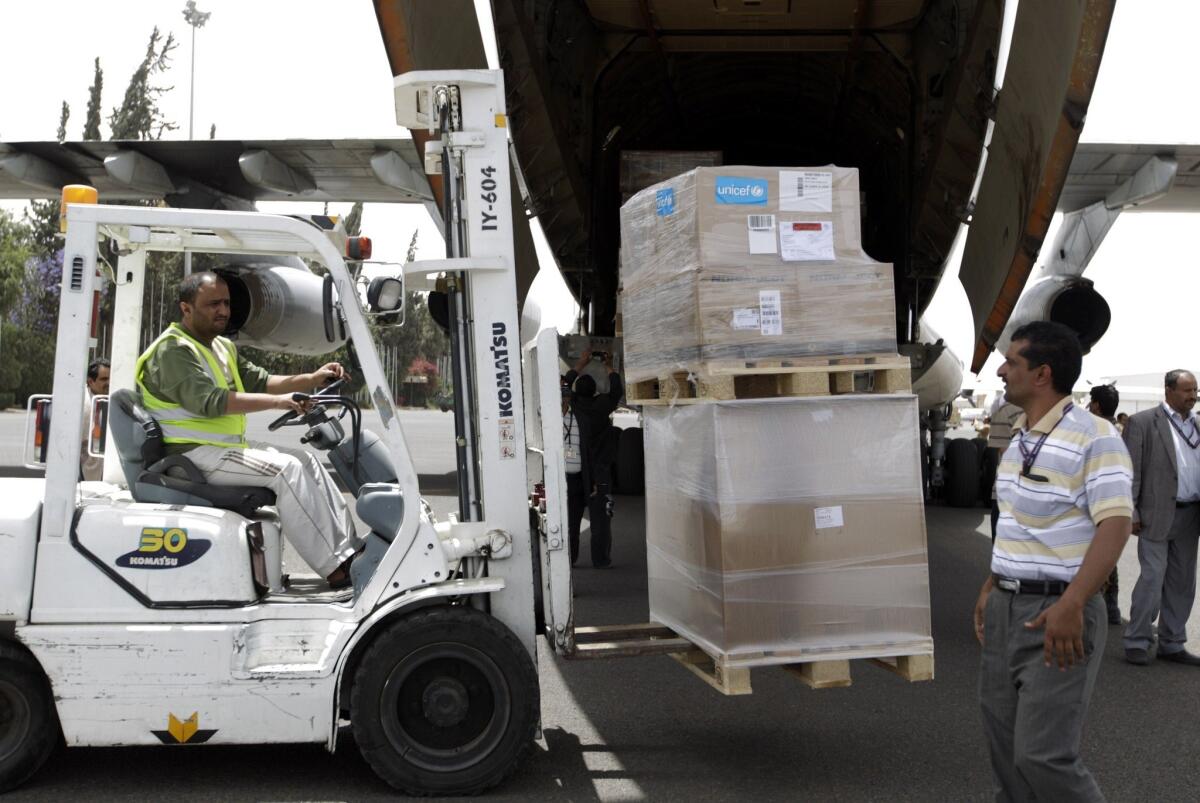Much-needed medical aid arrives by air in Yemen

Emergency medical aid from UNICEF is unloaded from a plane at the international airport in Sana, Yemen, on Friday.
- Share via
Reporting from Sana, Yemen — Desperately needed medical aid began arriving in Yemen by air on Friday for the first time since the start of a Saudi Arabian-led air offensive, amid growing signs of public anger over the death and destruction caused by more than two weeks of bombardment.
The two relief flights, shipments of medical aid and food supplies from the International Committee of the Red Cross and the U.N. children’s aid agency UNICEF, landed in the capital, Sana, hours after the city was battered by thunderous overnight strikes.
Aid officials expressed relief at the shipments’ arrival but described them as falling far short of meeting crushing humanitarian needs. Smaller shipments had previously arrived by sea, but those have been largely blocked by fighting.
The Saudi-led air campaign is targeting Shiite Muslim Houthi rebels and elements of Yemen’s military allied with the insurgents and deposed strongman Ali Abdullah Saleh. Forces loyal to exiled President Abdu Rabu Mansour Hadi have been trying to turn back the Houthi offensive in Yemen’s north and south, with the fiercest fighting concentrated in the strategic southern port of Aden.
Concerted bombardment has failed to dislodge the rebels from Aden, the country’s commercial hub. And in Sana, which the Houthis seized last year, residents reported some of the heaviest bombardment since the start of the air war, with overnight strikes hitting bases and weapons caches held by the Houthis and Saleh loyalists.
The Saudis have mustered the support of regional allies including Egypt, but on Friday, lawmakers in Pakistan – which has a powerful and well-equipped military – declined to join the coalition. Parliament urged a peaceful resolution of the crisis.
In the capital and elsewhere, Yemenis poured into the streets for large-scale demonstrations denouncing the air strikes, while mosque preachers condemned the carnage from the pulpit. Many people are furious with both the Houthis and with the “popular committees” loyal to Hadi, who fled last month and has been sheltering in Saudi Arabia.
The fighting in Yemen underscores the sectarian tensions roiling the region. Sunni Muslim Saudi Arabia regards the Houthis as instruments of aggression on the part of Shiite Muslim Iran. The Tehran government denies arming the rebels and has denounced the Saudi-led military campaign in ever more strident terms.
On Friday in Tehran, a day after Iran’s supreme leader, Ayatollah Ali Khamenei, excoriated the bombardment as a “genocide,” sermons at Friday prayers – the most important of the Muslim week – denounced Saudi Arabia and the United States, which has been providing the Saudis with logistical support and expedited weapons shipments.
Al-Alayaa is a special correspondent. Special correspondent Ramin Mostaghim contributed to this report from Tehran.
More to Read
Sign up for Essential California
The most important California stories and recommendations in your inbox every morning.
You may occasionally receive promotional content from the Los Angeles Times.













